Strict Standards: Only variables should be assigned by reference in /home/noahjames7/public_html/modules/mod_flexi_customcode/tmpl/default.php on line 24
Strict Standards: Non-static method modFlexiCustomCode::parsePHPviaFile() should not be called statically in /home/noahjames7/public_html/modules/mod_flexi_customcode/tmpl/default.php on line 54
Strict Standards: Only variables should be assigned by reference in /home/noahjames7/public_html/components/com_grid/GridBuilder.php on line 29
It's the sort of repeated daily change -- between black clerical clothes, vestments for Mass, work clothes and back again -- that he's still getting used to as a first-year Catholic seminarian.
"I've been sweating constantly and that's frustrating, I got to be honest," he says. "I enjoy the schedule, but there are parts of the schedule I don't like -- and that's a good thing. It works on obedience."
Ask Massaro what he used to think his life would look like at 24 and the answer is immediate: "Nothing like this."
He had girlfriends. He was a sports nut who couldn't get enough of his New York Giants. He enjoyed the adrenaline rush of triathlons and Tough Mudder obstacle courses.
He enrolled in a Ph.D. program in medical physics at Vanderbilt University and imagined a career that would allow him to care for a family.
Now he's one of nine men taking part in their "Spiritual Year" at Saint Charles Borromeo Seminary -- one stop in a seven-year journey to become priests.
Unlike the other 130-plusseminarians living at Saint Charles' sprawling, picturesque campus on Philadelphia's Main Line -- where Pope Francis will stay this weekend -- these men are spending the year in a no-frills brick building 20 minutes away. Living with them is the Rev. Christopher Cooke, who directs the one-year program and serves as an adviser.
It's a dedicated time spent apart -- free of tests, grades and outside tensions -- to go deep, focus on prayer and develop their personal relationships with God.
"But," says Cooke, "don't get the idea that this is a year of resting in hammocks."
Measuring the 'Francis effect'
Saint Charles is part of the Archdiocese of Philadelphia, which last month announced the seminary's enrollment had grown three-fold. Twenty new seminarians entered this fall, compared to seven the year before. It's the largest increase in more than a decade.
Coming two years after Francis' election, could the uptick in wannabe priests be linked to the Pope's popularity?
The Rev. Charles Frederico, a vocation director for the Jesuits, has suggested as much.
"There's no doubt Pope Francis is having an effect on young people," says Frederico, who serves as a sounding board to those considering the priesthood.
He's been fielding anywhere from five to seven inquiries a week. Before Francis, he says, he received one inquiry a week, and sometimes none.
"I've never heard so many Jesuits talk about the Pope," Frederico says of members of the Society of Jesus, which works with people on the margins and carries a strong social justice component. "He's speaking our lingo." As he should, given that Francis is the first Jesuit to become pope.
But the vocation director for the Archdiocese of Philadelphia is more guarded.
The Rev. Stephen DeLacy trusts that the "Francis effect" is real, but he says all of the guys he's worked with since the start of this papacy would have made the leap to seminary even if Pope Benedict XVI was still leading the Catholic Church.
He thinks next year will be a better time to measure Francis' influence. A new vocation recruitment program, "Called by Name," is being introduced this fall to build on the Pope's Philadelphia visit and the ways the archdiocese expects him to inspire parishioners.
Francis may be important to would-be seminarians in that he's "creating an atmosphere that's freeing them up to come in," DeLacy says. But Philadelphia was also caught up in the priest sex abuse scandal, which had a "dampening effect" on enrollment -- an effect that, with time, may only now be lifting.
The need for more seminarians and, by extension, priests, is real, says Mary Gautier, senior research associate at the Center for Applied Research in the Apostolate. She points to statistics to show the glaring decline over the years.
Peak seminary enrollment, she says, was in the late 1960s. In 1965, there were 8,325 graduate-level seminarians. Today, at 3,650, the numbers are less than half. Meantime, the number of priests in the United States fell from nearly 59,000 in 1965 to less than 38,000 today. And while the number of seminarians has held pretty steady over the past 15 years, in the 3,500 range, Gautier says the country is ordaining each year "only about a third of what we need."
Whether Pope Francis will help bring in the needed numbers, she says, remains to be seen.
The Pope: Not just for Catholics anymore
On girlfriends and marriage
Ultimately, it was not the Pope, but rather a string of girlfriends and priests that led Chris Massaro to Saint Charles.
He grew up in the Catholic Church in Coatesville, Pennsylvania -- an old steel town west of Philadelphia -- though his family was not particularly devout. He got involved with a parish youth group in high school, and his devotion grew further when he went to nearby West Chester University and began frequenting the Catholic ministry center on campus.
The center's director asked him a couple times if he'd ever thought about the priesthood, but his answer was a knee-jerk "no" -- not because the idea disgusted him, Massaro says, but because he assumed he was on track to wed.
"My Catholic upbringing wasn't very in depth, so I wasn't around priests other than Mass on Sunday," he says. "My only exposure was to marriage. And there's nothing wrong with that, but it doesn't really open you up so much to other possibilities."
Massaro says he appreciates how Pope Francis has made the Catholic faith accessible. He's "on a level that ordinary Joes can grasp, which is great," Massaro says. "That's what we need to meet people where they are."
And while he's been influenced by the Pope, Massaro says he's in seminary thanks to others -- including the priests and Catholic communities he came to know in high school, college and graduate school.
But it's through his relationships with women that he traces how he ended up at Saint Charles.
He arrived at college already a year into a relationship, which continued into his sophomore year. She was Christian, but not Catholic, and "I couldn't get her to come to Mass," he says. As he became increasingly devout, this became more of a struggle.
To his relief, his next girlfriend was Catholic, but she also wasn't as committed to the faith. By his third relationship, he found a woman who was an involved Catholic -- but to his dismay, they, too, had differences.
"I was expecting others to conform to me as opposed to me really looking inside," he says. He began to realize that he was looking at these relationships in a "prideful and selfish way." A switch flipped, and he turned to prayer.
For 54 days straight he recited the Rosary Novena, asking for humility. He began to see that "an authentic Catholic relationship, an authentic Christian relationship with our Lord and the people around us, is supposed to be selfless -- and I hadn't been living that way."
He opened himself up to possibilities. He realized "my life was meant to be lived as a gift in the way God intended from the beginning."
At Vanderbilt, he began going to Mass four or five times a week. On top of that, he did an hour of prayer every day. And in a leap of faith, he came here.
Massaro says at first he was nervous to tell people. Friends who weren't Catholic. The director of his Ph.D. program. (Massaro left Vanderbilt early with only his master's.) His family.
"I was expecting some kickback," he says, "but I didn't really get too much, which was great."
Instead, he found people were supportive in ways he didn't anticipate.
He credits "the power of prayer" for this -- not just his own, but the prayers he received from others who knew he was grappling with this decision.
But he still isn't 100% sure he'll see his new journey through to the end.
"Marriage is a beautiful vocation. It truly is," he says. "I was drawn to marriage and still am in a lot of ways. It's not resolved. That's one of the reasons this process is so long. This is not something to take lightly."
According to DeLacy, the vocation director for the Archdiocese of Philadelphia, about 50% of seminarians go on to the priesthood and 50% "discern out." They, too, though are a success in his mind, "if they have greater clarity in what God's will is in their lives."
'Like a dream'
A typical day during the Spiritual Year starts with prayer at 6:15 a.m. And it ends with prayer at 9 p.m., followed by silence. Interspersed there are meals, Mass, rosary, more prayer, "interior time" for studying, reading, more prayer, and classroom time. They attend classes on scripture, Catechism and spiritual classics. They engage in courses on a broad range of topics including celibacy, evangelization and salvation history.
The seminarians here are on a media fast -- no cell phones, TV, computers or Giants for Massaro. They do have Saturdays off and get some free time each day, which is when he squeezes in a run -- and another clothing change. They also must work to keep their collective home clean.
As Massaro vaccums the entryway (he's now wearing sports shorts, a T-shirt and running shoes), Ryan Nguyen approaches, his hands covered in long green rubber gloves.
Just weeks ago, the former pharmacist, 33, was managing 10 associates and overseeing the distribution of 2,000 prescriptions a week for Rite Aid. Now he's on a break from cleaning toilets.
"Staying humble," Nguyen says with a laugh.
He describes himself as a "cradle Catholic," born into the religion. But he came back to the faith with a full embrace about three years ago. That was when, amid doomsday talk surrounding December 21, 2012, and the Mayan calendar, he felt compelled to walk into a confessional.
He's not proud of who he was then. His hair was dyed yellow. He was partying. He was dating three women at the same time, "like a pimp," he says.
"Lust," he remembers the priest telling him, "is poison to the soul."
They were words he says he needed to hear. Soon he found himself "in love with the Blessed Mother."
All of his siblings are doctors and pharmacists. Initially, they thought he was nuts.
"My sister told me, 'You need a psychological examination,' " he says. "I was so pissed at her."
But now, as he heads back to clean more toilets, he couldn't be happier.
"I feel like I have to pinch myself," he says. "It's like a dream."
What Pope has said about key issues facing the church
Answering the call
Over a communal lunch of pasta, meatballs and salad, two other seminarians chime in with snippets of their own stories.
Gus deSimone, 27, was doing pro-life and chastity education before he landed here. Andrew Auletta, 22, recently graduated from Penn State. For both of them, the journey to this place was an extended process -- a calling that began as a whisper, not as a sudden beckoning that arose overnight. Like Massaro, they don't credit Pope Francis for their decision.
"I didn't come here because of him," says deSimone. "He's more of an affirmation than a reason."
Before deSimone took the leap, he remembers his grandmother saying to him, "When are you going to find a nice girl?" When he finally revealed why that wasn't going to happen, she gave him a card with a Bible quote.
Auletta says his family was not surprised when he announced his intentions; only his grandfather -- an ex-Catholic turned agnostic -- expressed initial disappointment.
More nerve-wracking for them than telling their families was sharing the news with peers.
Auletta talks about the sex-abuse scandal that's dogged the church. He says he had to ask himself, "Am I going to let this take me away from Christ or bring me closer?"
DeSimone thinks on this and invokes the saying about not throwing the baby out with the bathwater.
"You can't," he says. "Some want to throw out the baby, but it's still a baby."
And that baby -- their church and faith -- still needs tending to.
These men, and others like them who flock to seminaries, pray to do their part.

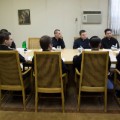

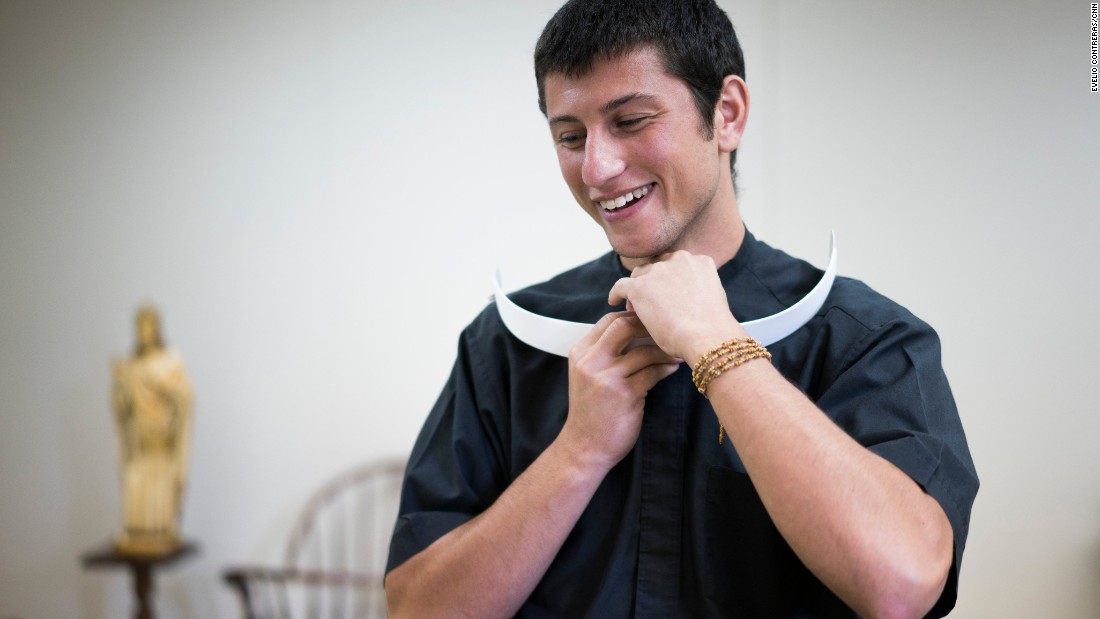
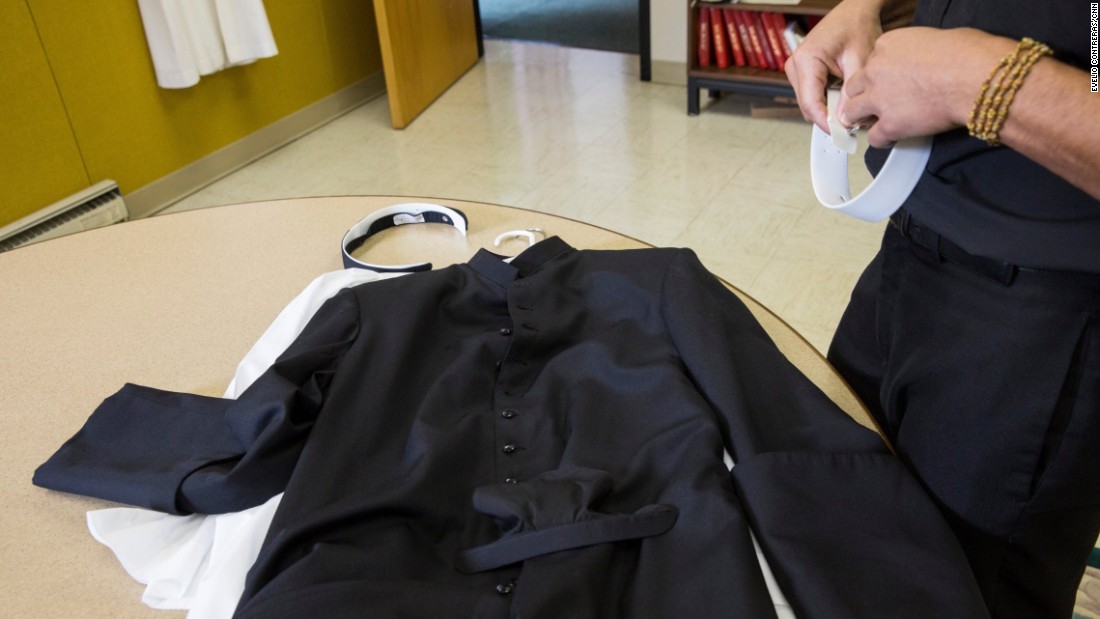
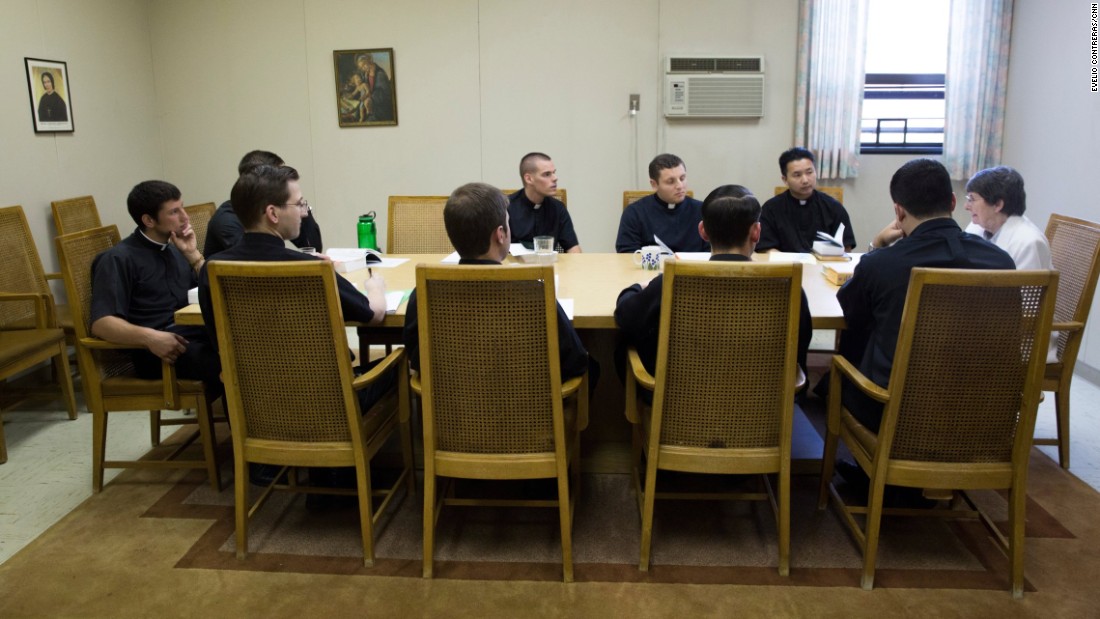

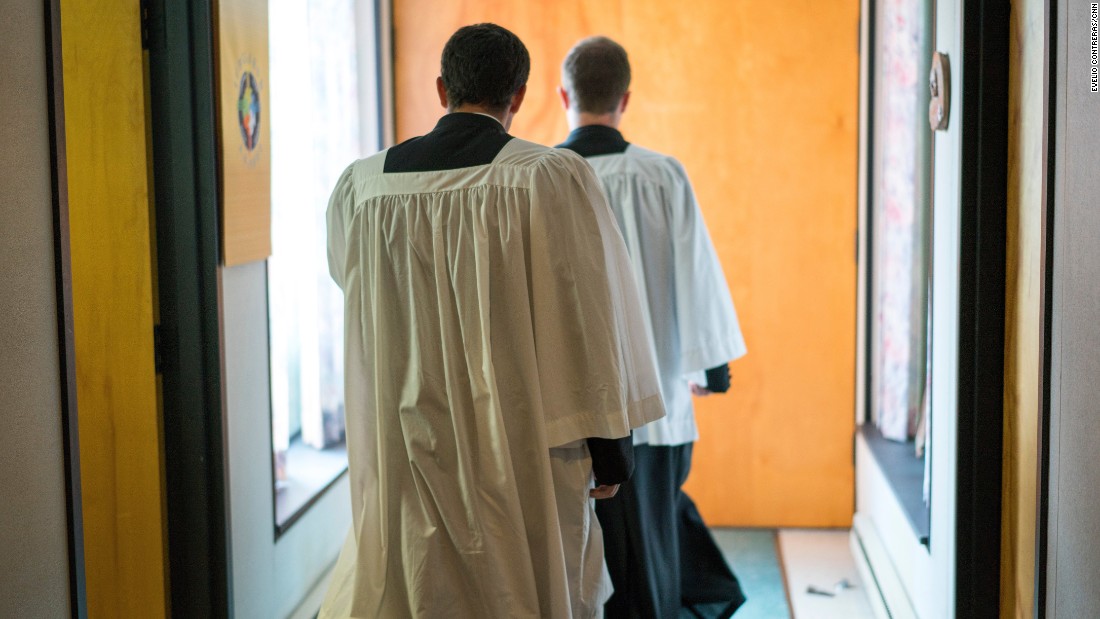
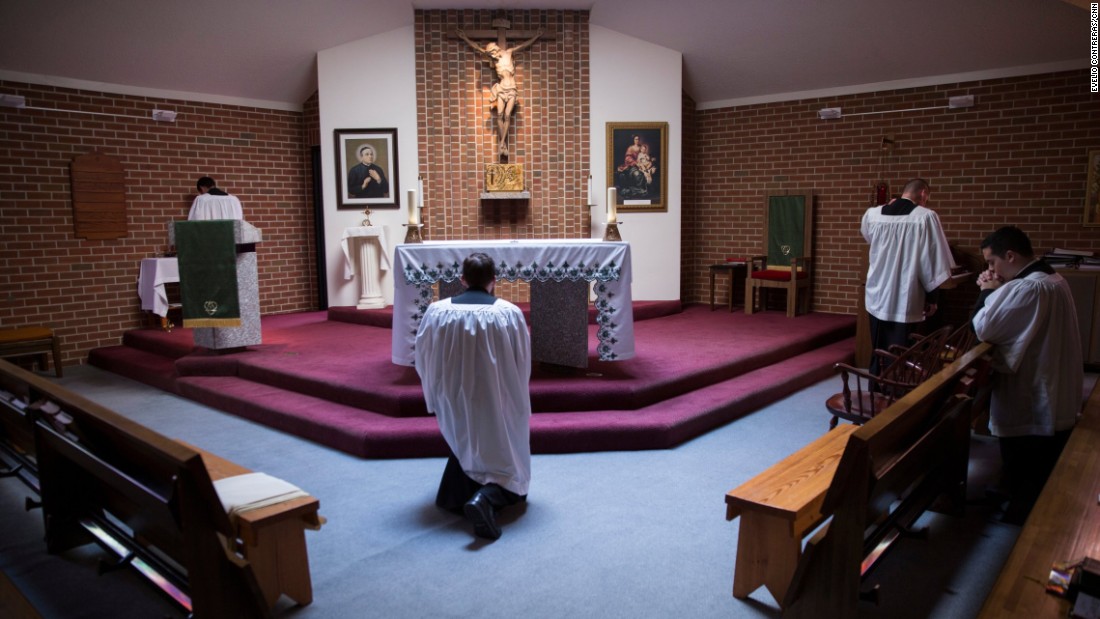
Strict Standards: Only variables should be assigned by reference in /home/noahjames7/public_html/modules/mod_flexi_customcode/tmpl/default.php on line 24
Strict Standards: Non-static method modFlexiCustomCode::parsePHPviaFile() should not be called statically in /home/noahjames7/public_html/modules/mod_flexi_customcode/tmpl/default.php on line 54
Find out more by searching for it!
